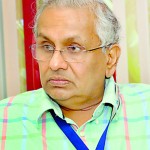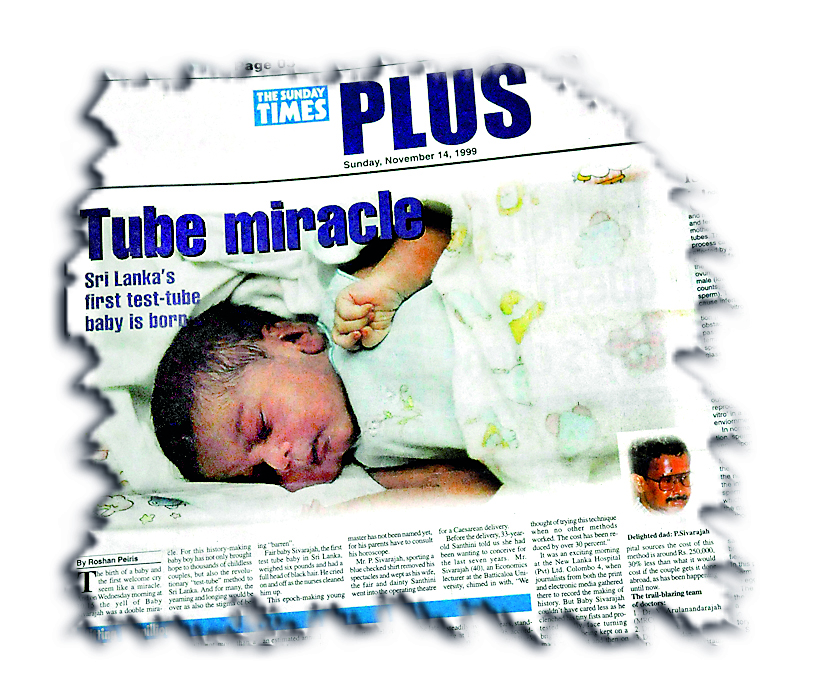‘Miracle’ birth of a sibling set him on his future course
View(s):One week he spends in Jaffna and the next in Colombo, commuting between the northern and southern cities either by Intercity train or luxury bus.
It was not long ago that he was in England, but now that he is retired after 36 long years, fertility specialist Dr. Muthukrishna Sathanandan, 65, has made a conscious decision to give of his expertise to those in the country of his birth.
Having worked with two Nobel Prize winners, the honour of which he believes he is the only Sri Lankan to be blessed with, he had also been part of the pioneering team which was instrumental in bringing test-tube baby technology to Sri Lanka.

Dr. Sathanandan
“This country witnessed the first such birth 15 years ago,” says Consultant Obstetrician and Gynaecologist Dr. Sathanandan who has extensive training in this wide ranging field of Assisted Reproductive Technology (ART) in the United Kingdom (UK), Australia and United States of America (USA).
The determination, however, to get into this field gripped him long before he entered the Colombo Medical Faculty, having been born in Jaffna and securing his primary and secondary education at Hartley College, Point Pedro.
This deep-seated desire to gain expertise in fertility treatment was a home-grown thing. For many years, he saw his family’s desperate need to have a baby.
“After me, my Mum was not able to have a child for 13 years,” he says, recalling the many visits to doctors by his parents from the time he was 11 years old.
The encouraging words of Prof. Sinnathamby in Peradeniya still ring in his ears. “I will operate on your mother and you will soon have a brother or sister,” he had said reassuringly, and he did just that.

15 years ago: The Sunday Times story on Sri Lanka’s first test tube baby
The family’s elation knew no bounds when Prof. Sinnathamby kept his promise and they were able to bring home a tiny baby – his younger brother.
For 13-year-old Muthukrishna it was a miracle which ended in a baby and it was then that he saw the path ahead of him clearly. Medical School it was when the time came and no agonizing over what his specialty would be. Passing out of the Colombo Medical Faculty in 1973, his internship was at the hospital specializing in births, the De Soysa Maternity Home. It was to the UK that he headed after several more years for his post-graduate studies in Obstetrics and Gynaecology remaining there even after – five years in Scotland and then at the Queen’s University Hospital in London.
Sub-specialty training in fertility followed with Dr. Sathanandan crossing the Atlantic to work in California and flying half-a-world away in the other direction to the University of Adelaide in Australia. Finally it was intensive training at the University of Cambridge, working with trailblazers in in-vitro fertilization (IVF), Patrick Steptoe and Robert Edwards. The world’s first test-tube baby, Louise Brown, was born on July 28, 1978, in UK due to their efforts. Edwards would later go on to win the Nobel Prize for Medicine in 2010.
Considering himself to be “extremely lucky”, Dr. Sathanandan believes that he is the first Sri Lankan clinician to be trained in this field from 1985-89 and the only Sri Lankan to have worked with two winners of the Nobel Prize for Medicine. In addition to Edwards, he had worked at the San Diego University in the US with Roger Guillemin who dabbled in biochemistry, endocrinology and metabolism. Guillemin was awarded the Nobel Prize in 1977.
It was while he was in the UK that Dr. Sathanandan and Dr. Jayanth Mehta were invited by Dr. V. Arulanandarajah of the New Lanka Hospital (Pvt) Ltd., in Colombo 4, to be part of the procedures that would lead to the birth of the first in-vitro fertilized baby in Sri Lanka on November 10, 1999 through a Caesarian operation. It was a baby boy born to P. Sivarajah and his wife, Santhini.
Now back in Sri Lanka since March 2014, with his wide-ranging skills, he has a burning desire to develop an “excellent” fertility centre here.
Pointing out that “fertility” is a huge problem in the country, he explains that the essential laboratory work in ART would be carried out by a team he has mobilized from abroad, human embryology scientists Pamela Turner, Frederick Oliver and Dr. Mehta.
| Egg freezing and egg donation facilities for Jaffna
Come September Dr. Sathanandan has major plans not only for Colombo but also for Jaffna, to enable couples who have so far not been able to conceive, to experience the joy of childbirth. This fertility specialist is quick to point out that the treatment should be evidence-based. There is also no need for patients to seek hospital admission as it is an outpatient treatment. After initial treatment, he would monitor those in Jaffna closely and they would need to come to Colombo due to lack of laboratory facilities over there, only when egg-retrieval has to be performed. IVF would follow and the embryo implanted in the mother’s womb in three days. She would have to rest only for a week. His vision for Sri Lanka includes “innovative” stuff including egg-freezing and egg-donation and also setting up a sperm bank in Jaffna. Egg-freezing would enable high-flyers who are unable to devote time for reproduction to freeze their eggs and when the time is right thaw them and start a family, says Dr. Sathanandan, adding that he has already initiated an egg-donor recruitment programme. Searching for 30 egg-donors who are under 35 years old, he has found six and screening is due to begin in September. He has also introduced a blood test that would indicate the anti-mullerian hormones (Amh). Not done in Sri Lanka before, this blood test which would be carried out in Mumbai, India, once the blood specimens are sent there shows the quality of eggs in a female patient. The eggs usually fall into the category of ‘good’, ‘substandard’ but could be used in IVF or ‘poor’ which cannot be used. ” I am hoping to introduce this test in Sri Lanka shortly,” he assures. Fertility is on the decline with the ‘fertile age’ in women being between 18 and 35 years, according to him. As the woman’s age advances, 35-38, 38-40, 40-42, 42+, the chances of conceiving with her own ovum (egg) become difficult. This is the time that donor eggs would come in handy. There is also a difference between Colombo and Jaffna, he says, adding that in Jaffna 50% are more than 40 years of age when they marry. It is double jeopardy to this conflict beleaguered region, for the situation has spawned displacement as well as young people not being able to find the right partner. “Age is the single most important factor which has an impact on fertility. The biological clock keeps ticking as marriage becomes secondary and career plans get preference,” says Dr. Sathanandan. He says that in Asian women, the ovum reservoir seems to come down at a young age, three to five years earlier than Caucasians who undergo these changes between 40 and 45. The quality of eggs also drops with advancing age. However, men’s fertility does not decline until about the age of 55. Smoking and alcohol use affect fertility but in Sri Lanka it does not seem to be a problem among the men. In women, the vulnerability to certain diseases such as fibroids, endometriosis and adenomyosis which increases with age could also adversely impact fertility. Meanwhile, dealing with the disadvantages of IVF, Dr. Sathanandan says that they include multiple pregnancies and hyper-stimulation of the ovaries which can lead to the patient becoming very ill. |


